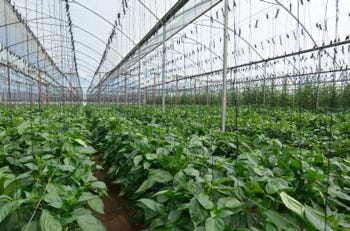New masterbatch significantly boosts service life of greenhouse films
Tosaf (Kfar Yona, Israel), a leading manufacturer of additives, compounds and masterbatches, has announced the development of a new UV4120PE masterbatch that can considerably extend the service life of UV-absorbing greenhouse films, even in tiny amounts.
February 26, 2015
Tosaf (Kfar Yona, Israel), a leading manufacturer of additives, compounds and masterbatches, has announced the development of a new UV4120PE masterbatch that can considerably extend the service life of UV-absorbing greenhouse films, even in tiny amounts.
In comprehensive accelerated weathering tests, the UV-filtering efficiency of conventional films stabilized with an organic UV absorber and nickel quencher (Ni-Q) was shown to have decreased to a mere 30% after a period of 9000 h, caused by extensive dissociation and decomposition of organic molecules. Adding just 0.7% of Tosaf's UV4120PE boosted this to about 80%, while 2% masterbatch upped the residual UV-barrier to an outstanding 90% at the end of the test period.
|
Image courtesy africa/freedigitalphotos.net. |
Very similar results were obtained with films containing an organic UV absorber and an N-alkoxy hindered amine light stabilizer (NOR-HALS). Hence, depending on the region, the total service life of greenhouse films can lengthen from just one to more than three years.
UV-absorbing films produced with Tosaf's new UV4120PE masterbatch can offer numerous advantages to greenhouse operators, all of which ultimately contribute to improving product quality. Beyond extending the general weather-protection properties of such films in the long term, the desired anti-virus effect, which is associated with a high UV-absorbing efficiency, remains largely constant over the entire service life of the film. This effect is due to the fact that many insects, which are potential viral vectors, need UV light to navigate and, thus, will not enter deeply into areas covered by UV-absorbing films. However, the company was careful to point out that the absence of UV light also prevents bees from entering such areas, which means that such films should not be used for growing plants pollinated by bees.
According to Tosaf, red rose growers, in particular, could reap special benefits from using UV-absorbing films, which have been found to be very effective in preventing petals from blackening.
About the Author(s)
You May Also Like



